Meet the presidents: College presidents prepare for a year like no other
Wielding power in their respective commons and in the Student Association Senate, college presidents are perhaps the most visible faces of the student leadership that is essential to the Rice experience. But just a few weeks after this year’s cohort began their terms, their communities dispersed as students were sent home to study online. Now, the presidents must lead their colleges amid conditions completely unknown to all who came before: distancing rules, a ban on mass gatherings, students who may never actually be on campus and other pandemic-related changes. They may not have signed up for these new challenges, but they are surely stepping up to face them.
The following interviews have been edited and condensed for clarity.
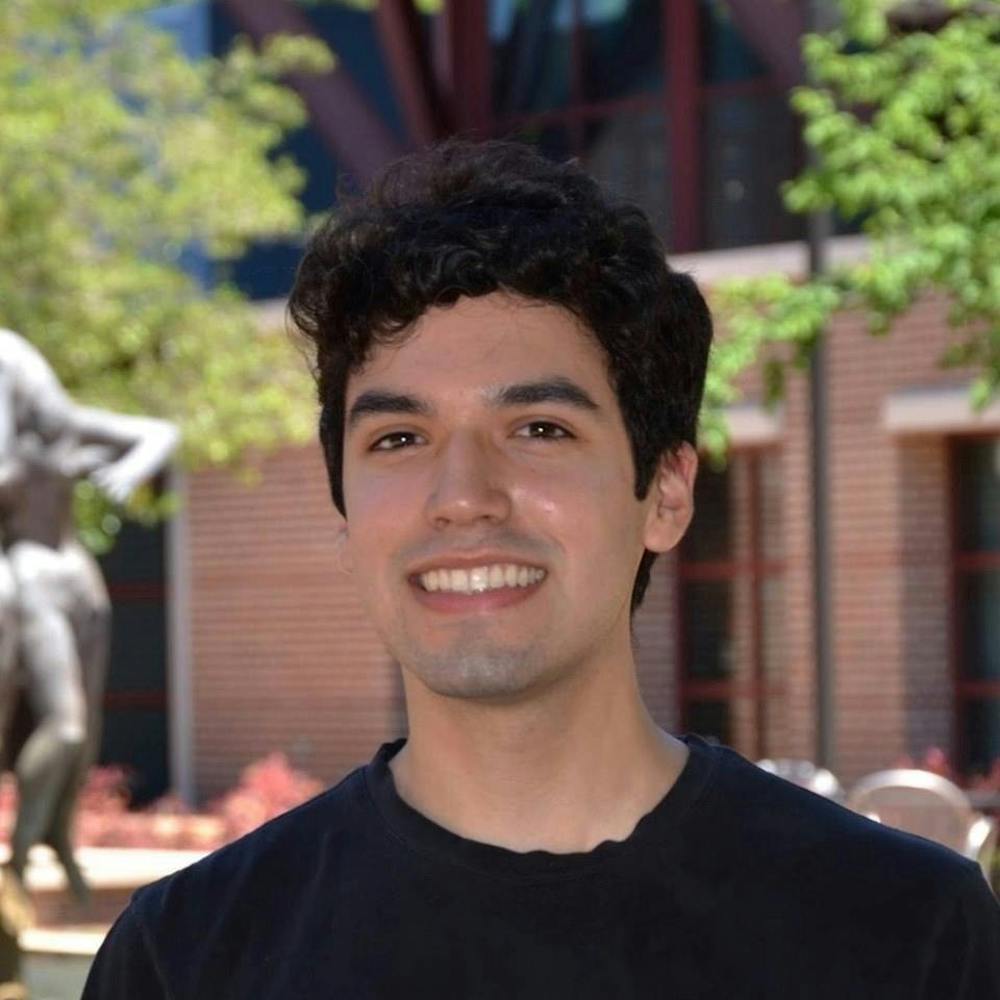
Baker College: Adam Cardenas, senior
What do you bring to the table as president of your college?
“I think the main three qualities I bring to the table as president are friendliness, care and hard work. I try my best to be open and available for anyone and everyone through active listening, relating with commonalities and understanding differences. I love getting to know others and becoming involved with their amazing passions and interests. Lastly, I prioritize Baker responsibilities [highly] and dedicate a massive amount of time and energy to ensure our community is cheerful, Bakerites are comfortable and all voices are heard. In essence, Baker is in my spirit, and my spirit is in Baker.”
What is your vision for your college?
“My vision for Baker is that we adapt to the hybrid model and learn how to support our diverse populations, whether Bakerites are 20 feet from commons or halfway across the world. I want every member of the college to feel supported, heard and empowered this semester to not only do their best in academics and in their personal life journeys, but to prioritize their own mental health and wellbeing. Whatever happens this semester, I want Baker to maintain its culture and cohesion in whatever capacity possible.”
What has your term been like so far, especially now that you’re back on campus with some of the undergraduate population?
“Honestly, my term has been difficult. From the very beginning, I felt I was not meant for this role and that I was incapable of leading the college; imposter syndrome definitely hit hard. However over these past few months, I’ve come to better understand myself and grow in confidence by working with the other presidents, leading projects with my college government and facing challenges at every corner. Now with the fall semester starting, I’m keeping a close eye on updates to stay prepared for anything. I’m currently hopeful and am trying to establish some sort of normalcy in my personal life and within the college.”
How are your leadership and plans changing in response to the extraordinary circumstances of the pandemic?
“I used to be a massive micromanager which occasionally caused problems in leadership roles. However given the extraordinary circumstances now, there just wasn’t time or energy to micromanage anymore, so my leadership style was forced to develop. This paved the way for more collective leadership and responsibility as college government leaders managed multiple projects simultaneously to develop our home and grow together. At Baker, maintaining our community culture and health has definitely been a team effort, and I am very proud of all the leadership and involvement on the college level.”
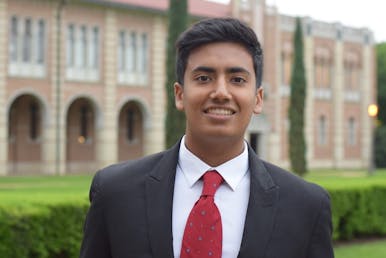
Will Rice College: Rahul Popat, senior
What do you bring to the table as president of your college?
“Throughout my time at Rice I have gotten the opportunity to serve in different student government roles both at Will Rice and on a campus-wide level. From these experiences I have really been able to learn how student leaders have been effective and what they have accomplished. On top of that I really love Will Rice and have a strong drive to keep the community the amazing place it is.”
What is your vision for your college?
“My main vision is for Will Rice to be an inclusive community that supports all of its members regardless of their background. In the past [I’ve felt] that some people might not feel as included in the community for a variety of reasons and that has affected their involvement with the college. Now more than ever, it is paramount that we open up our college for all of its members.”
What has your term been like so far, especially now that you're back on campus with some of the undergraduate population?
“Most of my term has been adjusting to the new reality of COVID-19. In the spring, I worked with my [executive committee] to build a virtual community for Will Ricers while we were scattered across the globe. During the summer I worked with the other presidents and the administration to figure out and understand how Rice was going to come back in the fall. Finally, over the past weeks my [executive committee] and I have been working towards [carrying] over important parts of Will Rice from the past and brainstorming new ideas for the future.”
How are your leadership and plans changing in response to the extraordinary circumstances of the pandemic?
“As our [Orientation Week Coordinators] reiterated numerous times, the most important part of leadership during a time like this is to be flexible. While I have had to put aside many of the specific plans and ideas I had for Will Rice, all of the new decisions I face are still guided by the vision for inclusivity that I had in the beginning. Now the scope for this has expanded since we also want to make sure that our remote students have access to the same community as the in person students. I have had to adapt the vision I originally had to fit the current needs and circumstances.”
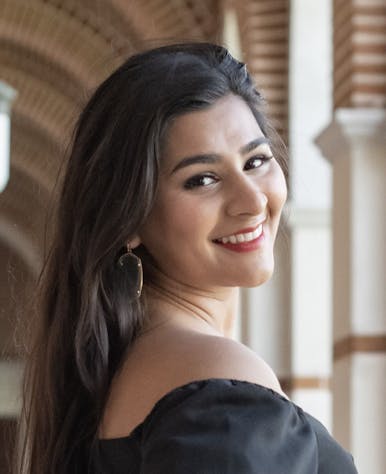
Hanszen College: Nikhita Gangla, senior
What do you bring to the table as president of your college?
“I’d like to think that I am able to bring people together, and inspire them to participate in and better our community.”
What is your vision for your college?
“I want students to know and feel that Hanszen will always be there as their ‘home base,’ a community that they can seek comfort in. We call ourselves and pride ourselves as the ‘Family College,’ and that spirit of ‘it will always be here for you if you need’ is an amazing legacy that I want to continue and build upon.”
What has your term been like so far, especially now that you're back on campus with some of the undergraduate population?
“Incredibly hectic! The first couple of weeks that I was back, I was just making sure that things were running smoothly. I also spent time thinking about nitty gritty things that we would have to address, such as changes in Hanszen legislation to accommodate students' needs during this period.”
How are your leadership and plans changing in response to the extraordinary circumstances of the pandemic?
“In terms of more overall goals, I really want to place a greater emphasis on community building. The restrictions that we face due to the pandemic this year will make it harder for us to carry on with our traditional events and activities. Additionally, we are on schedule to have [the new Hanszen dormitory] built in the 2021-2022 school year, and I want to ensure that we are able to preserve our traditions and spirit of togetherness throughout this 2-year period where things will be ‘abnormal.’”
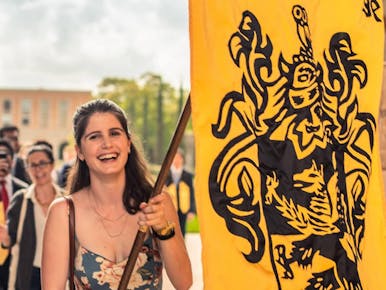
Wiess College: Lauren Biegel, senior
What do you bring to the table as president of your college?
“I think I bring strong communication skills and organizational abilities to the table. With the everchanging COVID situation, I’ve done my best to communicate consistently with my college and act as a resource for them in understanding the rules and how to stay safe. I’ve also tried to ensure that things are done efficiently and consistently so that people don’t feel like Wiess is making things even more complicated for them.”
What is your vision for your college?
“My vision is that all Wiessmen can bring their talents and passions to the table and feel
included. We have a lot of established ways to serve the college, but we’ve seen a lot of creativity recently that really makes me excited. We have someone crocheting a big Wiess blanket that people can add to and someone else who does a lottery every month and bakes for people’s birthdays. I hope to see more of these nontraditional types of involvement this year and beyond.”
What has your term been like so far, especially now that you're back on campus with some of the undergraduate population?
“So far, it’s been very focused on getting people safely back on campus. We as
presidents spent the whole summer working with the Dean’s Office on the policies and figuring out what those would mean for our community, so I feel very lucky to be back and to see all that work come together.”
How are your leadership and plans changing in response to the extraordinary circumstances of the pandemic?
“Coming in, my plans were focused on expanding our definition of what it means to be
involved at Wiess. I think, if anything, that has become more important in the pandemic. With new and returning students being remote and a larger proportion of the college off campus, I think creating new ways for involvement beyond attending events and being physically in the college will be crucial to building community in this time.”
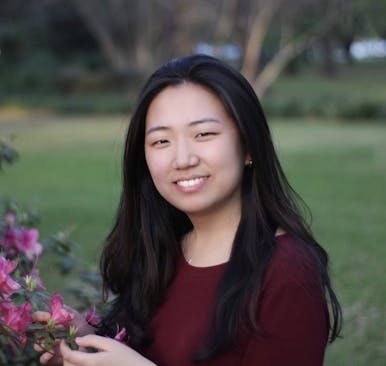
Jones College: Hannah Kim, senior
What do you bring to the table as president of your college?
“This was a bit difficult and awkward for me to answer myself, so I asked a good friend at Jones and she said I bring a ‘can-do’ attitude, a lot of patience and creativity. I hope other Jonesians feel I exemplify those qualities as well! If not, then at the very least, I think my peers see me as organized and action-oriented. When I think of doing something, I plan it out and tend to see it through its execution.”
What is your vision for your college?
“My vision for Jones is to have a well-integrated community of both in-person and remote students so that all Jonesians, wherever they are, feel welcomed and included into the family. I also hope people can feel as though Jones is a channel through which they can connect with people during a time when we are all so spread apart.”
What has your term been like so far, especially now that you're back on campus with some of the undergraduate population?
“So far, I've been pretty busy trying to lay down the foundations for the semester, making sure all other positions feel equipped and knowledgeable of what they have to do this semester as well as supported to try new ideas. I also have been trying to make sure people get accustomed to the COVID-19 guidelines, which definitely requires a learning curve.”
How are your leadership and plans changing in response to the extraordinary circumstances of the pandemic?
“Because the pandemic makes me feel like we're in a constant state of flux, I know I have to be a lot more flexible and creative in everything I do. The way we used to do things might not be the best way to do things now, so I've been trying to critically examine why we do things in certain ways and consider how we can change it up in a way that might actually be better in the long run. I also do my best to be very understanding when I ask things of my peers because I know this is a more difficult semester for most people in terms of balancing their school work, extracurricular responsibilities and their own wellbeing.”
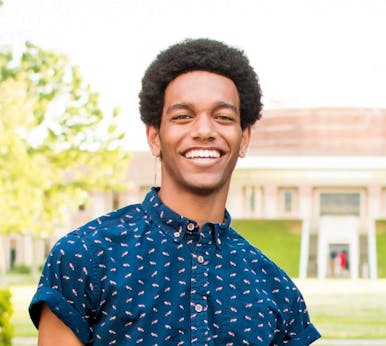
Brown College: Ev Delafose, senior
What do you bring to the table as president of your college?
“In the past two years, I’ve worked as a [Students Transforming Rice Into a Violence-free Environment] liaison and president of Rice Pride. In both of these positions, I’ve seen the difficulties that students face in feeling at home at Rice, and a lot of it stems from alienation from a community, either by the community or by an individual within the community. From being queer, to being Black, to having three jobs that take me away from my home college, I understand, personally, the difficulties of feeling at home in what is meant to be my ‘second home.’”
What is your vision for your college?
“At Brown, I’ve seen the most beautiful relationships and community connectedness ever, but I’ve also seen the other side where students feel as if they have to leave campus or the college system altogether because of one person, a group of people or a lack of one person or a group of people. My entire vision is predicated on community building and creating spaces for many different communities to feel at home and mentally and physically safe at Brown.”
What has your term been like so far, especially now that you’re back on campus with some of the undergraduate population?
“Entering this position under the weight of a pandemic definitely started the term off on a stressful note, to say the least. The whole summer was anxiously figuring out how Rice [would] work in possible scenarios that kept unfolding across other college campuses. So most of my term has been focused on logistics, both before and while students were filling up the campus. Trying my best to understand, communicate and clarify the insane amount of information that is cycling across campus has also been a large bullet point because students are worried, reasonably so.”
How are your leadership and plans changing in response to the extraordinary circumstances of the pandemic?
“For the most part, my plans are remaining the same, but hopefully, they’re increasing significantly in their accessibility. COVID made a lot of people, myself included, realize the possibilities of accessibility, and I hope to bring a lot of these possibilities to the community building that will continue throughout the year. My leadership, though, is definitely rounding out more. I’m being forced to learn how to lead, delegate, support and care for my fellow leaders during a pandemic, all while trying to care for myself, mentally, physically and emotionally.”
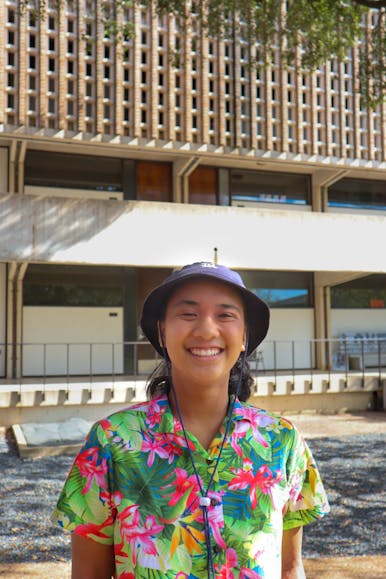
Lovett College: Chloe Oani, senior
What do you bring to the table as president of your college?
“I consider my role as president as very similar to being a team captain for my college. (Cue one of the other presidents: ‘Can you tell she’s a sport management major?’) I always root for my community's success, take initiative in navigating our pitfalls and try to maintain a positive attitude during times of adversity.”
What is your vision for your college?
“I’m incredibly grateful that Lovett has become my definition of home, but I understand that this isn’t the case for everyone. My vision for Lovett is that regardless of your current relationship with our college, Lovett will always be there for you. To do this, we have to engage in critical conversations necessary to create positive change. I've learned throughout my term that collaboration and discourse aren't mutually exclusive and that we can foster an environment that healthily balances both. Ultimately, I want to generate the perspectives that provide a multi-faceted united approach to doing what's best for our community.”
What has your term been like so far, especially now that you're back on campus with some of the undergraduate population?
“I feel a lot more energized being back on campus. I find my motivation to get stuff done by being surrounded by other people, whether that be learning in the classroom, working in commons or on Field 6 playing Powderpuff. Obviously all those activities look a lot different now, but navigating these changes with my peers makes me feel less like the dog surrounded by fire in the ‘This Is Fine’ meme.”
How are your leadership and plans changing in response to the extraordinary circumstances of the pandemic?
“During the season one finale of one of my favorite shows, ‘Silicon Valley,’ one of the characters suggests that their team ‘pivot’ when things were looking particularly grim for their future. I initially had concrete ideas to tackle some of my goals but given the circumstances, most of them are no longer feasible. Instead, I’ve tried to take Jared Dunn’s advice and ‘pivot’ — make progress on those initial plans from a new angle. The global pandemic has created a lot of uncertainty, but I hope we learn to capitalize on the new opportunities it has brought our community too.”
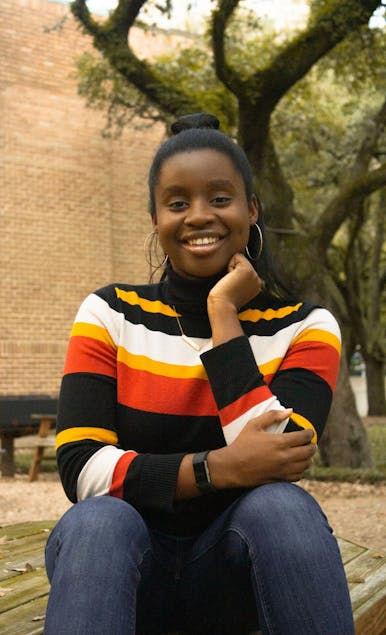
Sid Richardson College: Nia Prince (photo courtesy of Nia Prince)
Sid Richardson College: Nia Prince, senior
What do you bring to the table as president of your college?
“As president, I believe that I offer previous experience working with a variety of different projects at Rice and Sid, and can therefore be a resource to Sidizens when connecting them to what they need anywhere on campus. I've made it very clear over the past three years that I love this college, and I think my enthusiasm and sacrifice is appreciated by the community. I've made a point, before and during my term, to get to know the students in Sid, to hear people across every issue, and push for interaction in every community I've been in.”
What is your vision for your college?
“I hope to look back one year from now and see a college that has embraced a new building as an exciting opportunity for change rather than a potential loss of culture. I want Sid to spend this transition period examining aspects of our culture we appreciate and aspects we can improve on. For the ones we love, we must find a way to adapt it in a new building layout. For the ones we can improve, we must discuss within our community how we can do better. All of this requires engagement and participation from as many Sidizens as possible.”
What has your term been like so far, especially now that you’re back on campus with some of the undergraduate population?
“So far, my term has been a whirlwind. I think I've learned pretty quickly that this role is never what you expect, and it is constantly changing so I have to be willing to adapt to that. However, I've still enjoyed the past few months and the new parts of the role, such as helping provide the student perspective on the fall return plan. The president cohort did a lot of planning over the summer so I think it is just great to finally be back and actually see the students engage in it.”
How are your leadership and plans changing in response to the extraordinary circumstances of the pandemic?
“I think it is pretty clear that Sid is by far the college that has been most impacted by the circumstances of the pandemic and the return to campus. This was definitely something I didn't expect when I first ran for this position, but I don't think it has completely changed my plans or intentions for this role. I think the stakes are even higher now for the New Sid transition that I had anticipated. Now, more than ever, Sid needs to feel unified and connected so I think this has become even more of a priority in my term than it already was.”
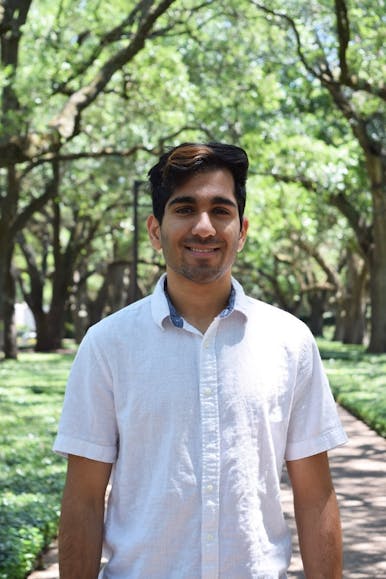
Martel College: Paras Gupta (photo courtesy of Paras Gupta)
Martel College: Paras Gupta, senior
What do you bring to the table as president of your college?
“What I bring to the table for my college is a high level of flexibility. While I do like to go into situations with action-oriented plans, I think I’ve realized that often expecting the plan to not go perfectly is truly the best plan. Working with people often, I bring a calm demeanor, and I place a high level of importance on listening to and understanding all perspectives. I try to be for the college what it needs in the moment, whether that is energy, focus, compassion, an advocate or even just a consistent helping hand.”
What is your vision for your college?
“I believe that Martel is in a transitional period and I’d like to ensure that Martel has clear direction moving forward. We’re one of the youngest colleges and our traditions aren’t fully established. After my presidency I hope Martel has clear ideas of its areas to improve as well as action-oriented plans in order to do so. I’d like to involve our committees more in event planning to broaden the scope of events and the groups of people they attract. I’d like to give Martel more of a family feel where people are comfortable casually using our common spaces.”
What has your term been like so far, especially now that you’re back on campus with some of the undergraduate population?
“I’m a ton happier having come back to campus even if things are different. Being back, I can focus more on the vision I have for Martel rather than prepare for the school year. We put on a mock parliament for the new students for the first time this year, and it was definitely a success. My [executive committee] and I believe we have a viable plan for our changed budget this year and I expect Martel to throw some great events with it. The best part of being back is getting to have conversations with students about their ideas for Martel.”
How are your leadership and plans changing in response to the extraordinary circumstances of the pandemic?
“In some ways my term has been tumultuous given the circumstances, but I’m fortunate that in some ways things haven’t changed. Huge shoutout to my [executive committee] for handling the changes with great flexibility. What’s been difficult is I feel like my role has lost a lot of the independence I expected it to have. While I didn’t have any revolutionary ideas coming in, college presidency is a role that is what you make it to be. With the circumstances, I’ve had to do more of what administration has told me rather than go through with my own or Martel’s ideas.”
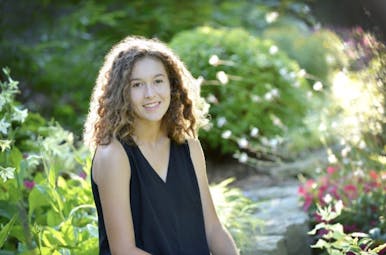
McMurtry College: Carolyn Daly, senior
What do you bring to the table as president of your college?
“I ran for president because I want to help people who feel like they don’t fit in at McMurtry, because I’ve struggled with that at times. I am organized, get things done, and most importantly, I’m always here to listen. I also have experience: I served as a First Year Rep, a co-secretary, At Large Rep and I chaired our Diversity Council. I started new initiatives like a committee fair and the McMurtry Cup, an event series that encourages hall bonding and provides activities for Murts who like more low-key social events. I want to build upon these projects to increase inclusivity.”
What is your vision for your college?
“I want to make McMurtry as welcoming and inclusive as possible, increase transparency and make sure McGovernment follows through on Murts’ ideas. I have been working closely with the diversity council this summer, and I’m excited about what they have planned: inclusivity training, affinity groups, accessible application statements, article chats and beyond. To follow through on Murts’ suggestions and increase transparency I am holding president ‘office hours,’ accounting for surprise expenses and making some simple yet important structural changes like creating a groupchat with all of our committee heads and implementing committee workshops in town halls.”
What has your term been like so far, especially now that you’re back on campus with some of the undergraduate population?
“Our president cohort did a lot this summer to support Rice's reopening plan, so it's exciting to be back on campus! We’re figuring out how to balance remote offerings and planning safe, socially distanced events. At McMurtry, we've focused on getting student feedback so we can plan things that are interesting to the greatest number of people. As one example of the kind of events we're planning, we had a ’Meet-a-Murt’ event this week that featured a committee fair so new students can get involved, a speed-dating event and hall/OC/remote bonding.”
How are your leadership and plans changing in response to the extraordinary circumstances of the pandemic?
“A big part of my role now is to gather feedback about the plans in place to keep Rice safe and to advocate for students at meetings with administration. For example, in the last week, we've worked to get more clarity on the Culture of Care agreement and communicated concerns about the servery. At McMurtry, I'm working with McGovernment, the McTeam, and public health ambassadors to figure out what a safe and fun college environment can look like. I also emphasize that our unexpected responsibilities don’t change our overall goals — it's important to prioritize long-term projects too.”
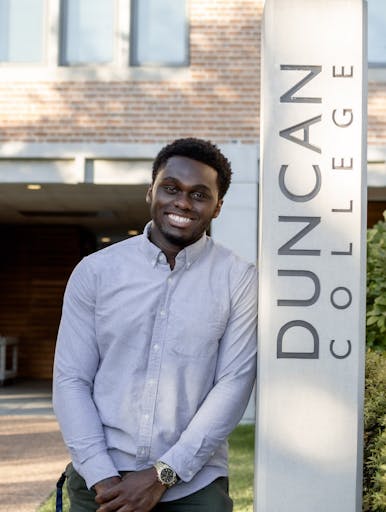
Duncan: Cordy McJunkins, senior
What do you bring to the table as president of your college?
“Drive and vitality. The conversations that I’ve had with many students, staff and faculty around campus these last few years have motivated me to focus on projects that address inequities and challenge the status quo. In terms of vitality, I’ve always been a pretty energetic person when I get involved with projects that I like, so I expect to continue that during my term.”
What is your vision for your college?
“I’m focused on creating more community spaces within Duncan so that people can have more places to hang out and meet other Duncan students. Also, I’m hoping to make our student government a support system that students can use to plan events or bounce ideas off of.”
What has your term been like so far, especially now that you’re back on campus with some of the undergraduate population?
“My term has been interesting, to put it nicely. My job has consisted of things such as organizing and cleaning up my college to prepare for students moving in, brainstorming virtual events and activities and lots of crisis management — and I mean a lot of crises.”
How are your leadership plans changing in response to the extraordinary circumstances of the pandemic?
“My plans haven’t really changed, to be quite honest. If anything, this pandemic has put the projects and issues I value most at the forefront of conversations around campus. These extraordinary circumstances have made it unequivocal that many of the issues that students have been advocating for need to be addressed, now more than ever. I think this pandemic has really opened our eyes to what is and isn’t possible, and I plan to utilize this opportunity to begin re-evaluating our existing structures at Rice.”
More from The Rice Thresher

Over 1,000 students petition against new meal plan
When Konstantin Savvon opened the Housing and Dining email announcing the new unlimited meal plan, he was instantly concerned about the impact on off-campus students like himself.
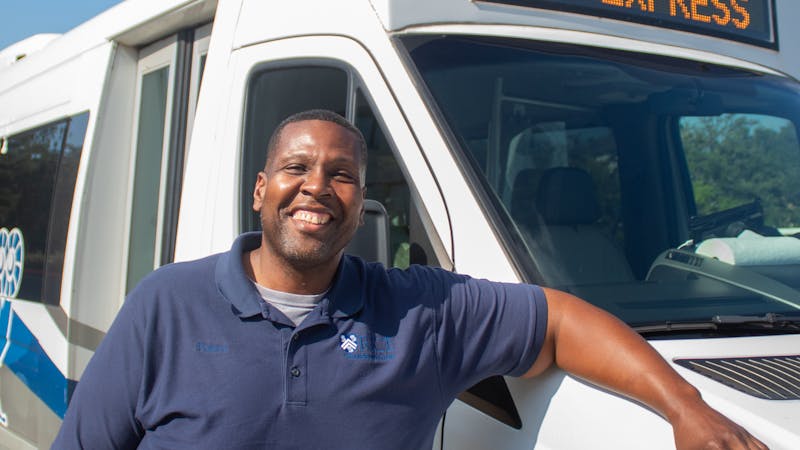
Rice shuttle bus drivers reflect on changes and connections behind the wheel
Martine Stewart has spent the past year behind the wheel of Rice’s greater loop shuttle, circling the inner campus from the early morning to late afternoon. She said she has come to recognize many of her regular riders – not just their faces, but the exact spots where they wait to be picked up.
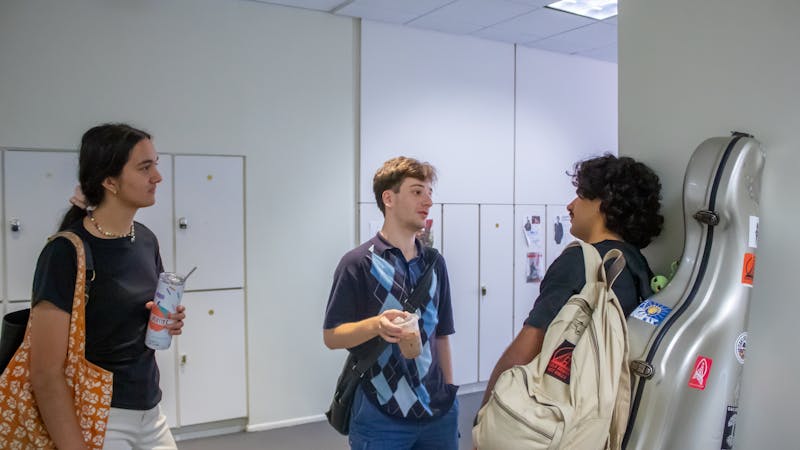
Music majors at Rice’s Shepherd School tackle busy schedules, future goals
Cirdan Vonnahme began playing the cello at 4 years old. After winning his first competition at 11 and debuting with an orchestra, he realized he wouldn’t mind playing the cello for life.

Please note All comments are eligible for publication by The Rice Thresher.